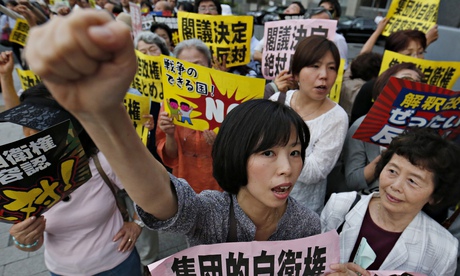Japan's prime minister, Shinzo Abe, is to defy public opinion and announce a dramatic shift in the country's defence policy that would make it easier for its troops to fight in overseas conflicts.
Abe's cabinet is expected to adopt a resolution on Tuesday that would end Japan's long-standing ban on exercising collective self-defence, or coming to the aid of an ally under attack even if Japan itself is not threatened.
Japan's postwar constitution prohibits the use of force to settle international disputes – a restriction Abe and his supporters say inhibits the country's ability to protect itself and its allies, despite growing fears over North Korea's nuclear programme and China's aggressive territorial claims in the region.
Abe's decision to introduce legislation that would reinterpret the pacifist clause in the constitution, which has prevented Japanese forces from fighting overseas since the end of the second world war, came after opinion polls indicated he would struggle to win enough support in parliament and among voters for outright constitutional reform.
The change to be approved on Tuesday would require a simple majority in both houses; his ruling Liberal Democratic party [LDP] has a comfortable majority in the lower house and controls the upper house with the support of a junior coalition partner. Changing the wording of the constitution, however, would require a two-thirds majority in both houses and a simple majority in a nationwide referendum.
In a poll published on Monday the Nikkei business newspaper found that 50% of voters were against overturning the ban on collective self-defence, while 34% supported the change.
The results were released a day after a man set himself alight in central Tokyo, apparently in protest at the policy. The unidentified man, who remains in a serious condition in hospital, had criticised Abe's proposals before attempting to kill himself in front of horrified onlookers.
The governing LDP has reportedly secured the support of its junior coalition partner, New Komeito, whose traditionally pacifist leanings had initially made a deal look impossible. Buddhist-backed New Komeito appears to have shifted its stance amid warnings from Abe that resistance could jeopardise the coalition.
Critics have accused the government of abusing its parliamentary majority to railroad a reinterpretation of the constitution through parliament after Abe abandoned the far more difficult, and time-consuming, option of outright constitutional revision.
"To develop legislation aimed at protecting the lives of citizens will lead to an increase in Japan's deterrent capabilities and reduce the possibility of being dragged into a war," Abe said last week.
"It is necessary to appropriately interpret the constitution. A decision on a constitutional revision should be made as the public debate deepens. I hope to see a national debate on the matter."
Supporters of the current constitution plan to demonstrate outside Abe's official residence on Monday evening.
The left-of-centre Asahi Shimbun accused Abe of abandoning Japan's postwar pacifism after minimal public debate. "This policy initiative, if it is pushed through, will leave the pacifist principles of the constitution totally eviscerated and the nation's public opinion bitterly divided," the paper said. "It will also leave the Japanese voting public even more distrustful of politicians."
Any measure that loosens the legal shackles on Japan's well-equipped self-defence forces is certain to anger China, with which Japan is embroiled in a dispute over the sovereignty of the Senkaku/Diaoyu islands in the East China Sea.
The US, however, has been putting pressure on Japan to play a more active role in their bilateral security arrangements, while the Philippines, which is involved in its own territorial dispute with Beijing, has also voiced support for the move.
Reinterpreting the war-renouncing article 9 of the constitution will give Japan's military significantly more leeway in coming to the aid of an ally – most likely the US – that has come under attack, even if the conflict is far from Japan's shores.
The change will also relax restrictions on Japan's participation in UN peacekeeping operations, currently restricted to non-combat roles,
and in so-called "grey zone" conflicts that have not developed into full-scale war, according to a draft of the proposal released to the media last week.
Government officials denied the policy change would give future leaders carte blanche to send Japan's military into reckless overseas wars.
Japan would exercise the right to collective self-defence only when "clear dangers" exist to the lives of people in countries "with close ties" to Japan, according to the most recent publicly available draft.
Military intervention should be "limited to the minimum amount necessary", it added.
The draft goes on to say that Japan will "ensure that its history as a pacifist state will continue".







